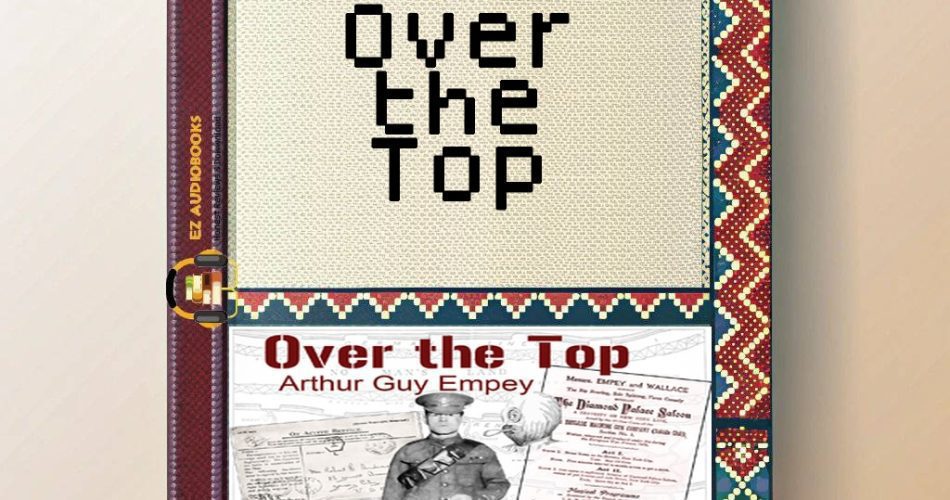Audiobook Sample
Listen to the sample to experience the story.
Please wait while we verify your browser...
- Title: Over the Top
- Author: Arthur Guy Empey
- Narrator: Mark F. Smith
- Length: 07:06:15
- Version: Abridged
- Release Date: 01/01/2016
- Publisher: LibriVox
- Genre: History, Military
- ISBN13: SABLIB9781620
There’s a particular magic that happens when a first-person war memoir meets the right narrator’s voice – it becomes something more than history, more than literature. It becomes a time machine. That’s precisely what happened when I pressed play on Arthur Guy Empey’s “Over the Top”, narrated by Mark F. Smith, during a long train ride through the French countryside last autumn. As the landscape rolled by – now peaceful vineyards where a century ago there was only mud and barbed wire – Empey’s words transported me into the trenches with shocking immediacy.
This LibriVox production offers us Empey’s 1917 memoir exactly as it deserves to be experienced: as oral history. The American volunteer’s account of serving with the British Army before U.S. entry into WWI remains one of the most visceral documents to emerge from the Great War. What surprised me most wasn’t the expected horrors of trench warfare (though those are rendered with unflinching clarity), but rather the moments of unexpected humanity – the dark humor in ‘Tommy’s Dictionary of the Trenches,’ the tenderness between soldiers, the surreal juxtapositions of beauty and devastation.
Mark F. Smith’s narration deserves special praise. His performance reminds me of those evenings in Oaxaca listening to abuelos tell stories – there’s a rhythmic authenticity to his delivery that makes you feel Empey’s voice is speaking directly to you across the decades. He captures the New Jersey accent of this American volunteer while effortlessly navigating the Cockney and posh British voices surrounding him in the trenches. The audio quality maintains LibriVox’s signature slightly raw quality, which paradoxically enhances the material – this isn’t a slick studio production, but rather feels like discovering a veteran’s personal recording in some attic trunk.
Empey’s perspective is particularly fascinating because he straddles two worlds – the eager American patriot and the battle-hardened soldier. His descriptions of enlisting after the Lusitania sinking carry that particular 1917 blend of idealism and outrage that’s hard to recapture today. The account of his training in England had me chuckling at the cultural collisions, while the later chapters describing his wounding during the Somme offensive left me genuinely breathless. Smith’s narration shines brightest in these combat sequences, where his pacing creates unbearable tension.
Modern listeners should approach this as both history and historical artifact. The unabashed patriotism and demonization of ‘the Hun’ reflect their time powerfully – this was, after all, written as recruitment propaganda. Yet beneath that surface, Empey’s eyewitness account reveals universal soldier truths that echo across all wars. His description of the ‘queer little lumps’ in no man’s land that turn out to be corpses, or the way veterans could distinguish between incoming and outgoing artillery by sound alone – these details stick to your ribs.
For those interested in WWI literature, this makes a fascinating counterpoint to Remarque’s “All Quiet on the Western Front”. Where the German novel is lyrical and philosophical, Empey’s memoir is blunt and episodic – more like a soldier swapping stories at a pub than a meditative work. That very quality makes it ideal for audio format. I found myself rewinding certain sections – like the darkly comic explanation of why soldiers preferred German grenades (they gave you five seconds to throw them back) or the heartbreaking account of a young recruit’s first night in the trenches.
The included ‘Tommy’s Dictionary’ appendix is worth the download alone. Hearing these slang terms – many now lost to time – made me reflect on how war transforms language just as it transforms landscapes and lives. Words like ‘suicide club’ (machine gun team) or ‘whizz-bang’ (a particular type of shell) carry layers of meaning no dictionary could capture.
As a free LibriVox production, there are occasional audio imperfections, but these never detract from the experience. If anything, they add to the sense of listening to something authentic and unvarnished. My only substantive critique is that I wish Smith had slightly varied his tone between the memoir’s main text and the dictionary section – the transition isn’t always clear to first-time listeners.
This audiobook particularly resonated with me because it mirrors experiences I’ve had interviewing veterans during my travels. There’s that same directness, that same mix of pride and trauma, that same need to bear witness. Listening to “Over the Top” while walking through what were once battlefields in France, I kept thinking about how Empey’s voice – preserved here so vividly – represents thousands of others we’ll never hear.
With ears tuned to echoes of history, Marcus
Marcus Rivera

